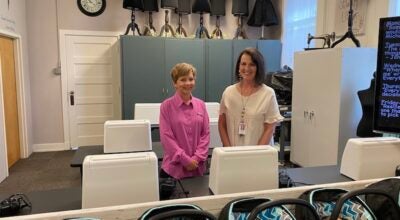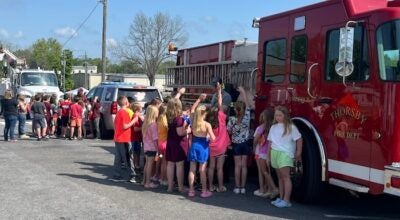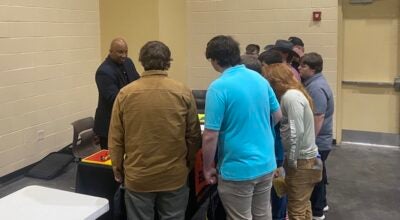Book signing at BHS Saturday
Published 9:29 pm Wednesday, March 10, 2010
Billingsley native and current Marbury resident Nancy Bone Goff didn’t think she’d publish a book about her brother’s unbelievable life story for anyone outside of her family to read.
As she began writing “One-Arm Boy in a Two-Arm World” about her brother DM, she thought the stories would inform future generations of her family on what kind of bloodline they come from. She wanted to flesh out the Bone family history.
But as she wrote her final pages, she realized she’d written a book anybody would want to read.
Set during the Great Depression, her brother’s early life was about survival, a subject with universal appeal.
“I’m not talking about just working to live, but survive,” Goff said. “My family had it so very hard.”
DM Bone, now 76, was the son of a sharecropper who barely brought in enough money to get his family by.
Faced with one hardship after another, including DM losing his right arm, the family persevered as their father influenced them to seek education, which farm families rarely did.
Goff said this biography serves as a testament to uneducated, poor farm families during that time period when she said neighbors would help each other during times of need.
Goff will release this book starting with a signing event from 1-4 p.m. Saturday at Billingsley High School’s auditorium.
She will read excerpts and introduce the subjects of her book, including DM. The event is open to the public.
A former magazine feature writer, Goff wrote an in-depth story about her brother that was met with positive response from the communities who read it.
As they got older, she told him she thought his life was interesting enough to fill a whole book.
She began taking notes as he would tell stories about his life, including several things she never knew. She also recalled tales her mother told and listened to cassette tapes DM recorded for her.
As he lost his arm due to a sudden bone disease, DM nearly lost his way or ambition to live with any vigor at all. His family encouraged him to develop his other arm physically by throwing rocks and playing baseball.
Soon, he met any challenge head on.
“From that point on, that’s how his life went,” Goff said. “If he couldn’t do it one way, he’d do it another way. That’s just the essence of a good book right there.
She sent her work to her publisher at Tate Publishing in Mustang, Okla., who immediately took to it.
Delving deeply into family history, one that exists during the rough and tragic times of the Great Depression, would make for an emotional experience to the hardest of souls.
To understand what her parents and other relatives suffered through just to survive, Goff felt she owed it to them to pursue this project. But it would not be easy.
“There were times when I would break down in tears,” Goff said. “And I was the one putting it down on paper. My brother told me the story about what happened when he discovered something was wrong with his arm, and his chin began to quiver. A tear rolled down the side of his cheek.
“Even for him, it was very emotional to retell some of these stories to me.”
Goff’s family saw the worst of times, not only financially as her father worked as a sharecropper that barely made enough to get by but also physically.
DM lost his arm, her sister contracted polio and her other older brother often broke his bones, sometimes right after they mended.
When she was 5 years old, Goff’s father died, which is where she decided to end her book. For DM, their father served as the force that kept their spirits high and their drive to survive intact.
“Daddy was the pillar that held my family together,” she said. “When he died, everybody went their own way. Fortunately, when you get old like me and my brother and sister, you tend to come back together.
“All the hard feelings, all the things that happened don’t seem important because you know you don’t have many more years left on this earth.”
Goff said it was very important to finish the book in time for her brother to read it during his old age. At 76, he read the story of his life and let his sister know precisely what he thought.
“He’s going blind,” Goff said. “His wife read it to him. When he called to tell me what he thought, he was crying. He said, ‘I loved the book, but I don’t ever want to hear it again. It’s hard for me to realize what we did go through.”
She said her sister has yet to read the book.
Goff’s father stressed education as one of the most important things his family could pursue. While he wasn’t afforded opportunities to learn, given his sharecropping occupation and obligation to his farm, he pushed his children to learn.
“My daddy could not read or write,” Goff said. “He could write his name, but barely. My mother had a sixth grade education. Daddy always made sure his children went to school. There was no way you could even think about quitting. An education was the most important thing you could have, he thought.”
She said farm families living in deep rural areas rarely got those opportunities because they never had the time.
Crops needed their attention. Forming sentences and performing arithmetic didn’t put food on their table at that point.
“A lot of people didn’t think an education was important,” she said. “They’d ask, ‘Why do you need one when you’re a farmer?’ That was daddy’s life. He didn’t go to school because he had to help with his father’s farm.”
The book signing will feature a live bluegrass band, named Fibergrass. A former country singer herself, Goff said she might hop on stage and sing a song or two if she has time.
“My main purpose is to talk about my book,” she said. “If I get a chance, I’ll get up and sing.”






